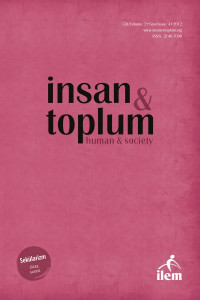Abstract
Tarihe yön veren iki başat kavram olan din ve iktisat arasındaki ilişkinin analizi, sosyal bilimler için hiç şüphesiz önemli bir yer tutmaktadır. Ontolojik olarak farklı tabiatlara sahip olan söz konusu bu iki unsurun birbiriyle ilişkisi, bu özgünlük göz önüne alındığında daha özel bir konuma yükselmektedir. Bu noktada, hem bağımlı hem de bağımsız değişkenler olarak ele alındıkları yaklaşımların, sosyal bilimler dâhilinde, özel araştırma alanlarına işaret ettikleri göze çarpmaktadır. Söz konusu alanların her birinin köklü bir geleneğe dayanması, karşılaşılan isimlerin büyüklükleri üzerinden de teyit edilebilir. Böylece; modernizasyon, sekülarizasyon ve iktisat sosyolojisinin deterministik yapısı ile dinî algının, serveti ürettiği yaklaşımlar bir tarafta; iktisadı bir meşrulaştırma işleminin bir tamamlayıcı aracı olarak ele alan dinî iktisat ile dinî tercihleri soğukkanlılıkla ele alan dinin iktisadı diğer tarafta durmaktadır. Ve bu ayrışma ile emperyal karakteri ve hesap gücüyle ilişkilerini yeniden konumlandıran iktisadın, tartışmalı doğası ortaya çıkmaktadır. Sonuç olarak söz konusu zıt dalgaların tesiri altında, mutlak olan ile kurulacak ilişkinin analizi de iktisat için bir öz bilince işaret etmektedir.
References
- Addas, W. A. J. (2008). Methodology of economics: Secular vs Islamic. Perpustakaan Negara: International Islamic University Malaysia Press.
- Agil, S. O. S. (1989). Rationality in economic theory: A critical appraisal. Journal of Islamic Economics, 2(2), 79-94.
- Azzi, C., & Ehrenberg, D. (1975). Household allocation of time and church attendance. Journal of Political Economy, February, 27-56.
- Buchholz, R. A. (1983). The Protestant ethic as an ideological justification of capitalism. Journal of Business Ethics, 2(1), 51-60.
- Chadwick, O. (2002). The secularization of the European mind in the nineteenth century. Cambridge: Cambridge University Press.
Abstract
Analysis of the relationship between religion and economics, as two dominant history-shaping concepts, without a doubt plays a significant role for the social sciences. The mutual relationship of ontologically different natures of these two elements, with a special position in this originality, rises to a more specific location. At this point, within the social sciences, approaches that consider as both dependent and independent variables, sign to stand out to specific research areas. Each of these areas that based on a long tradition, can also be confirmed on the greatness of the names encountered. Thus, with wealth creating religious perceptions, modernization, secularization and deterministic structure of economic sociology is on the one side , and with economics of religion dealing calmly at religious preferences, religious economics that considers economics as a complementary tool to a justification process standing on the other side. Through this decomposition, with the imperial character and accounting power, the controversial nature of economics appears by recoordinating its own relations. As a result, under the influence of the opposing waves in question, analysis of the relationship established with the ‘absolute’ also indicates to a consciousness for economics.
Keywords
: Secularization Idealtype Religious Economics Economics of Religion Choice Theory of Religion.
References
- Addas, W. A. J. (2008). Methodology of economics: Secular vs Islamic. Perpustakaan Negara: International Islamic University Malaysia Press.
- Agil, S. O. S. (1989). Rationality in economic theory: A critical appraisal. Journal of Islamic Economics, 2(2), 79-94.
- Azzi, C., & Ehrenberg, D. (1975). Household allocation of time and church attendance. Journal of Political Economy, February, 27-56.
- Buchholz, R. A. (1983). The Protestant ethic as an ideological justification of capitalism. Journal of Business Ethics, 2(1), 51-60.
- Chadwick, O. (2002). The secularization of the European mind in the nineteenth century. Cambridge: Cambridge University Press.
Details
| Primary Language | Turkish |
|---|---|
| Subjects | Economics |
| Journal Section | Research Articles |
| Authors | |
| Publication Date | December 1, 2012 |
| Published in Issue | Year 2012 Volume: 2 Issue: 4 |


